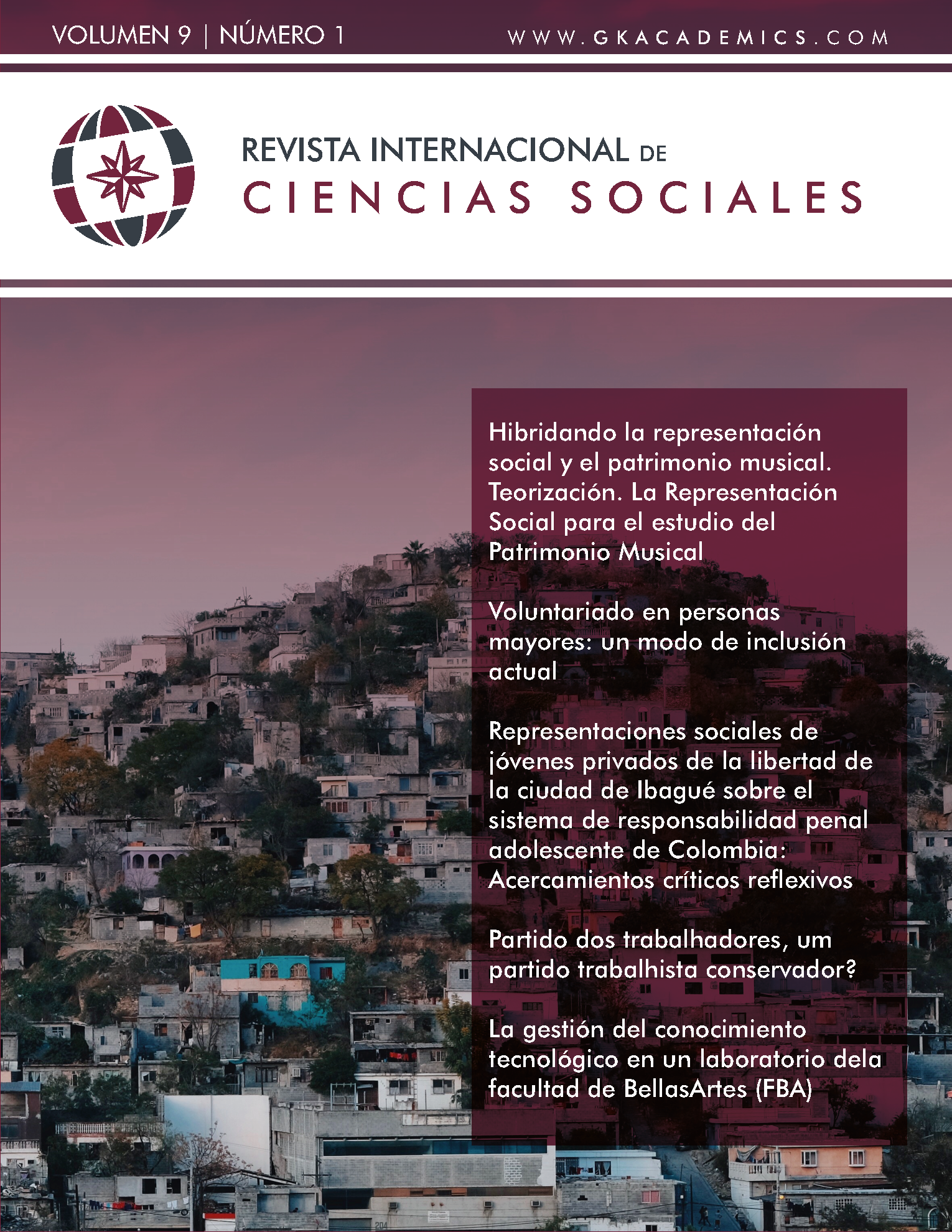Volunteering in the Elderly: a Current Inclusion Mode
DOI:
https://doi.org/10.37467/gka-revsocial.v9.2311Keywords:
Elderly, Volunteering, Social, InclusionAbstract
In the case of the elderly, volunteering programs represent a way of participation in society, promoting an aging quality. In the present work we set out to analyze various volunteer opportunities aimed at our elders. Currently there are some 30 volunteer opportunities throughout Spain. The results show that the majority of activities are emotional and personal accompaniment. The self-awareness of the elderly as a volunteer and their incorporation into the aforementioned regulatory frameworks is an increasingly necessary and growing issue.
Downloads
Global Statistics ℹ️
|
860
Views
|
366
Downloads
|
|
1226
Total
|
|
References
Agulló, M., Agulló, E., & Rodríguez, J. (2002). Voluntariado para mayores: ejemplo de envejecimiento participativo y satisfactorio. Revista interuniversitaria de formación del profesorado, (45), 107-128.
Ainscow, M. (2005). La mejora de la escuela inclusiva. Cuadernos de Pedagogía, 349, 78-83.
Banks, J. A. (2015). Emigración global, diversidad y educación para la ciudadanía. En: A. Escarbajal (ed.), Comunidades interculturales y democráticas: un trabajo colaborativo para una sociedad inclusiva, (pp. 15-24). Madrid, España: Narcea ediciones.
Bedmar, M., & Montero. I. (2017). La educación en personas mayores. En: N. Martínez y M. Bedmar (eds.), Personas Mayores y Educación Social: Teoría e Intervención (pp. 135-164). Granada: Editorial Universidad de Granada.
Belando-Montoro M., & Bedmar M. (2015). Las TIC y la educación en los estudios sobre la fragilidad en personas mayores. Proferosado, Revista de currículum y formación del profesorado, 19(3):348-360.
Bermejo, L. (2010). Envejecimiento activo y actividades socioeducativas con personas mayores. Madrid: Editorial Médica Panamericana.
Bukov, A., Maas, I., & Lampert. T. (2002). Social participation in very old age: cross-sectional and longitudinal findings from BASE. Berlin Aging Study. J Gerontol B Psychol, 57(6), 510-7. DOI: https://doi.org/10.1093/geronb/57.6.P510
Cutler, S. J., & Hendricks, J. (2000). Age Differences in Voluntary Association Memberships Fact or Artifact. J Gerontol B Psychol, 55(2), 98-107. DOI: https://doi.org/10.1093/geronb/55.2.S98
Hacesfalta.org. (s.f). Voluntariado. Recuperado de https://www.hacesfalta.org/voluntariado-mayores.aspx
Hechavarría, M. M., Ramírez, M., García, H., & García, A. (2018). El envejecimiento. Repercusión social e individual. Revista Información Científica, 97(6), 1173-1188.
Lago, O., & González, M. (2019). A propósito del artículo “El envejecimiento. Repercusión social e individual”. Revista Información Científica, 98(1), 5-6.
Ley 45/2015, de 14 de octubre, de Voluntariado. Recuperado de https://www.boe.es/buscar/pdf/2015/BOE-A-2015-11072-consolidado.pdf
Limón, M. R. (2018). Envejecimiento activo: un cambio de paradigma sobre el envejecimiento y la vejez. Aula abierta, 47(1), 45-54. DOI: https://doi.org/10.17811/rifie.47.1.2018.45-54
Maciá, E., Martínez, R., & Román, M. J. (2018). Promoción y formación del voluntariado con personas mayores en la universidad española. Revista INFAD de Psicología, 2(2), 99-116. DOI: https://doi.org/10.17060/ijodaep.2017.n2.v2.1083
Montero, I., & Bedmar, M. (2018). Ocio, tiempo libre y voluntariado en personas mayores. Polis Revista Latinoamericana, (26).
Peñalver, A. (2016). Buenas prácticas del Proyecto Piloto Enred@ te: red social digital para personas mayores y voluntariado de la Cruz Roja Española. Cuadernos de Trabajo Social, 29(2), 201-212. DOI: https://doi.org/10.5209/CUTS.51656
Requejo, A. (2003). Educación permanente y educación de adultos. Barcelona: Ariel.
Roig, C., Ávila, E., Mac Donal Bron, D., & Ávila, B. (2015). La atención al adulto mayor: un reto para la medicina contemporánea. Revista Cubana de Medicina General Integral, 31(3).
Serdio, C. (2008). La educación en la vejez: fundamentos y retos de futuro. Revista de educación, 346, 467-483.
Sitges, E., Lorente, R., & Saorín, M. J. (2018). Promoción y formación del voluntariado con personas mayores en la universidad española. Revista INFAD de Psicología, 2(2), 99-116. DOI: https://doi.org/10.17060/ijodaep.2017.n2.v2.1083
Urrutia, G., & Bonfill, X. (2010). Declaración PRISMA: una propuesta para mejorar la publicación de revisiones sistemáticas y metaanálisis. Medicina Clínica, 135(11):507-511. Doi: 10.1016/j.medcli.2010.01.015 DOI: https://doi.org/10.1016/j.medcli.2010.01.015
Windsor, T. D., Anstey, K. J., & Rodgers, B. (2008). Volunteering and psychological well-being among young-old adults: how much is too much? Gerontologist, 48(1), 59-70. DOI: https://doi.org/10.1093/geront/48.1.59
Downloads
Published
How to Cite
Issue
Section
License
Those authors who publish in this journal accept the following terms:
-
Authors retain copyright.
-
Authors transfer to the journal the right of first publication. The journal also owns the publishing rights.
-
All published contents are governed by an Attribution-NoDerivatives 4.0 International License.
Access the informative version and legal text of the license. By virtue of this, third parties are allowed to use what is published as long as they mention the authorship of the work and the first publication in this journal. If you transform the material, you may not distribute the modified work. -
Authors may make other independent and additional contractual arrangements for non-exclusive distribution of the version of the article published in this journal (e.g., inclusion in an institutional repository or publication in a book) as long as they clearly indicate that the work was first published in this journal.
- Authors are allowed and recommended to publish their work on the Internet (for example on institutional and personal websites), following the publication of, and referencing the journal, as this could lead to constructive exchanges and a more extensive and quick circulation of published works (see The Effect of Open Access).













